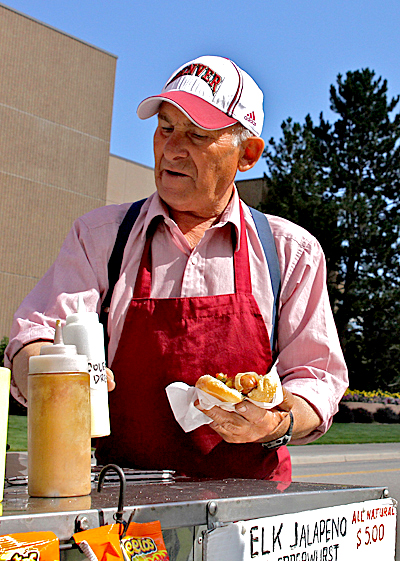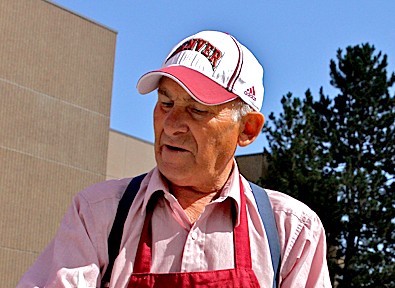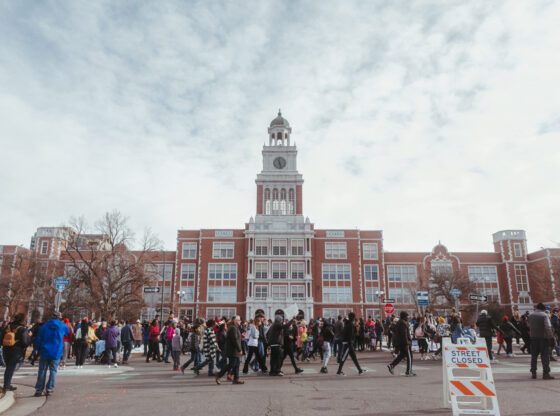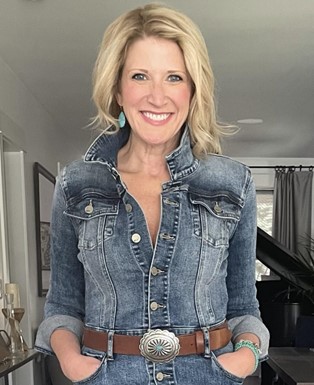
You might have known him as that kind hot dog guy on Asbury, the man you used to get advice from on a stressful day or even as the man who used to help you practice your Russian. No matter how you knew him, Yakov Neyman, who immigrated to the U.S. from Russia in 1992, has been one of the most recognizable and beloved members of the DU community for nearly ten years.
Yakov Neyman’s friendly presence on campus has been a crucial part of the DU experience for students, faculty and staff alike. That’s why when it was announced last month that Neyman passed away last October after battling cancer, it caused a great amount of sadness on campus – enough, that some students have even taken the initiative to prepare a memorial on campus in his honor.
Michael Krebsbach, who graduated with a degree in real estate and construction management last June, found out about Neyman’s passing on Jan. 23 when he called Neyman’s cell phone, only to get his granddaughter on the other end, who explained Yakov’s death.
“I was really close with Yakov,” said Krebsbach. “He was a really good man who everyone loved. Most people would interact with him when they were buying a hot dog, but they also went to him for advice and he would cheer them up and he always had a smile on his face. He was always more concerned about how you were feeling than how he was feeling.”
According to Krebsbach, when he announced the news on his Facebook page, he got a flood of responses saying how great a man he was. The post was shared on others’ Facebook pages 344 times.
“I found out from Michael,” said junior economics major from Denver, Amir Alsayegh, who is working to get a memorial placed near Asbury Street where Neyman used to work. “When he broke the news to everyone, I said we should do something in his honor, because he’s been around longer than a lot of institutions at DU.”
Alsayegh immediately got Chancellor Coombe’s blessing for the project.
“I actually ran into him one day and asked him if he could help me push it through,” said Alsayegh. “So he said ‘absolutely – you have my blessing, the project has my blessing. Anyone who gives you trouble, you tell them that the Chancellor wants this done.’”
Alsayegh isn’t sure exactly what type of a memorial it will be, but is thinking about possibly making it a bench made of limestone.
“People with serious anxiety about school or work would tell him ‘I’m really worried right now’ and he would say ‘why are you worried? Find what you’re worried about – should you be worried about it?’” said Alsayegh. “If he could just talk to every student I think we’d be a better campus. So I think a bench [where people can sit and relax] would be a really great memorial.”
According to Alsayegh, a DU sign made of limestone was recently torn down and he was told he is more than welcome to use the remains as material for the bench.
A lot of plans still have to be finalized for the project such as which company will make the memorial, what will be written on it and how the project will be funded. In addition, Alsayegh still has to work with the university architect to get the plan approved. But despite all of this, he still hopes to finish the memorial soon.
“This would normally take 6 months to a year to get everything in place,” said Alsayegh. “But we’re hoping to make it happen in closer to a month. Having the chancellor’s blessing is really helpful.”
According to Krebsbach, Neyman had a life and personality more than worth remembering through a memorial.
Neyman was born in 1939 just before the Holocaust, to a Jewish family in Babruysk, Belarus, a country bordered by Russia to the north and Ukraine to the south.
Head of the painting department, Deborah Howard, painted Neyman as a part of her art exhibit “Beyond the Shore” which focused on the Holocaust. She knew Neyman personally from this as well as her time spent at his hotdog stand.
According to Howard, Neyman told her that as a young child he became a refugee with his mother and brother, running from place to place to avoid the Nazis.
“Somebody came and knocked on their door and his mother answered, and they said you better get out because the Nazis are coming,” said Howard. “I know that his mother put his younger brother in her backpack.”
According to Howard, Neyman’s father was a soldier who was killed during the war.
Neyman, along with his mother and brother managed to survive the war by finding refuge with a family in Siberia. His home town of Babruysk having been destroyed, Neyman then grew up in Russia.
Neyman received his PhD in engineering during his time in Russia He started a family and worked at a chemical manufacturing plant in Leningrad.
Because of anti-Semitism that still persisted in Russia at the time, his mother moved to Denver right after Jews were allowed to move from Russia to Israel or the U.S. in 1980. Neyman followed 12 years later with his wife and daughter.
According to Krebsbach, he worked for an automobile company making airbags until he was laid off in his early 60s. Being older, and without English as his native language, finding a new job would have been extremely difficult for Neyman. So, he used his severance package to open his beloved hotdog stand.
The hotdog business was not an easy one. According to Krebsbach, on weekends Yakov moved his stand to a different location in Cherry Creek because there wasn’t enough business at DU.
“Plus, when there would be food on Driscoll lawn, he would go broke that day,” said Krebsbach.
Krebsbach also started a petition online to have Neyman hired by DU as part of its food service for events. Over 1,500 people signed the petition, and he and Neyman actually sat in on a student senate meeting to present their case, but nothing ever came of it.
“They didn’t give us a yes or no,” said Krebsbach, “They just didn’t actually do anything about it.”
Despite all of his struggles in life, anyone who knew Neyman would say that he had a very positive outlook and loved his work.
“I don’t know if he learned to love it, or if he loved it from the beginning,” said Alsayegh. “But he really loved what he did.”
Neyman was constantly giving advice to customers and trying to put a smile on their face.
“He told me to never fall in love, and that I should eat relish like my life depends on it,” said Marin Klostermeier, a sophomore psychology major from St. Louis, who used to visit his stand occasionally. “He was a very wise man.”
According to Howard, Neyman was always cheerful, and he cared immensely about everyone in his life.
“He always asked me about how my son was doing,” said Howard. “When I did his portrait, I photographed him once in the summer. He was always smiling and he just kind of had a sparkle in his eye. He just loved people, he really did.”
“I asked him to cater my graduation party,” said Krebsbach. “He almost broke down in tears when I asked him that. He was just really happy to celebrate my graduation.”
“The best part is he wasn’t stingy,” said Alsayegh. “You could walk up and order a hotdog and he’d make it for you. If I had forgotten my wallet he would say, ‘no don’t worry about it. It’s on me.’”
Alsayegh wants to preserve the memory of Neyman’s spirit and kindness in the best way possible. But in order to complete Neyman’s memorial project he still needs to find a means of funding. If anyone has any fundraising ideas or is interested in contributing to the cause, they are asked to contact Alsayegh at amir.alsayegh@hotmail.com.











